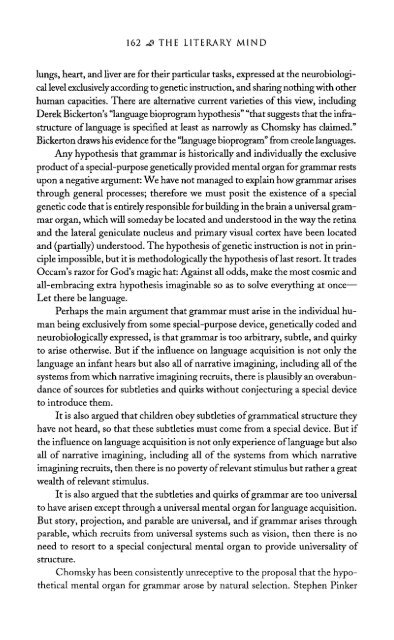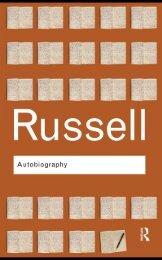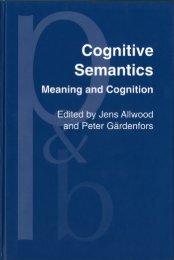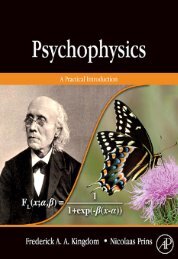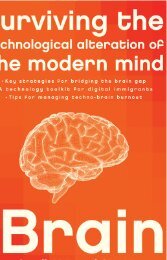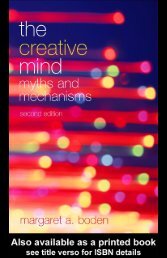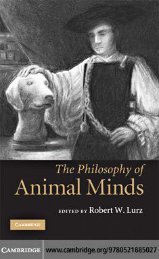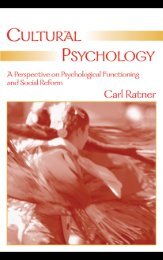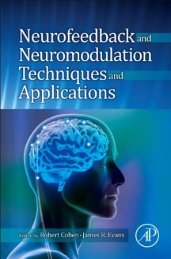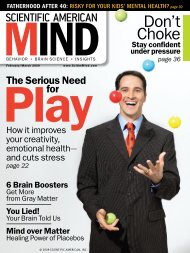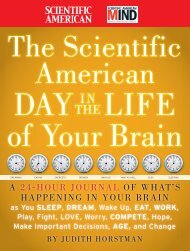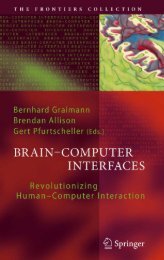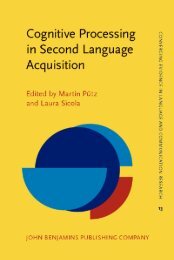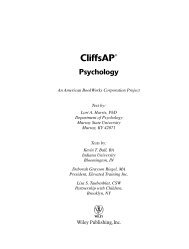The Literary Mind.pdf
The Literary Mind.pdf
The Literary Mind.pdf
Create successful ePaper yourself
Turn your PDF publications into a flip-book with our unique Google optimized e-Paper software.
162 THE LITERARY MIND<br />
lungs, heart, and liver are for their particular tasks, expressed at the neurobiological<br />
level exclusively according to genetic instruction, and sharing nothing with other<br />
human capacities. <strong>The</strong>re are alternative current varieties of this view, including<br />
Derek Bickerton's "language bioprogram hypothesis" "that suggests that the infrastructure<br />
of language is specified at least as narrowly as Chomsky has claimed."<br />
Bickerton draws his evidence for the "language bioprogram" from Creole languages.<br />
Any hypothesis that grammar is historically and individually the exclusive<br />
product of a special-purpose genetically provided mental organ for grammar rests<br />
upon a negative argument: We have not managed to explain how grammar arises<br />
through general processes; therefore we must posit the existence of a special<br />
genetic code that is entirely responsible for building in the brain a universal grammar<br />
organ, which will someday be located and understood in the way the retina<br />
and the lateral geniculate nucleus and primary visual cortex have been located<br />
and (partially) understood. <strong>The</strong> hypothesis of genetic instruction is not in principle<br />
impossible, but it is methodologically the hypothesis of last resort. It trades<br />
Occam's razor for God's magic hat: Against all odds, make the most cosmic and<br />
all-embracing extra hypothesis imaginable so as to solve everything at once—<br />
Let there be language.<br />
Perhaps the main argument that grammar must arise in the individual human<br />
being exclusively from some special-purpose device, genetically coded and<br />
neurobiologically expressed, is that grammar is too arbitrary, subtle, and quirky<br />
to arise otherwise. But if the influence on language acquisition is not only the<br />
language an infant hears but also all of narrative imagining, including all of the<br />
systems from which narrative imagining recruits, there is plausibly an overabundance<br />
of sources for subtleties and quirks without conjecturing a special device<br />
to introduce them.<br />
It is also argued that children obey subtleties of grammatical structure they<br />
have not heard, so that these subtleties must come from a special device. But if<br />
the influence on language acquisition is not only experience of language but: also<br />
all of narrative imagining, including all of the systems from which narrative<br />
imagining recruits, then there is no poverty of relevant stimulus but rather a great<br />
wealth of relevant stimulus.<br />
It is also argued that the subtleties and quirks of grammar are too universal<br />
to have arisen except through a universal mental organ for language acquisition.<br />
But story, projection, and parable are universal, and if grammar arises through<br />
parable, which recruits from universal systems such as vision, then there is no<br />
need to resort to a special conjectural mental organ to provide universality of<br />
structure.<br />
Chomsky has been consistently unreceptive to the proposal that the hypothetical<br />
mental organ for grammar arose by natural selection. Stephen Pinker


